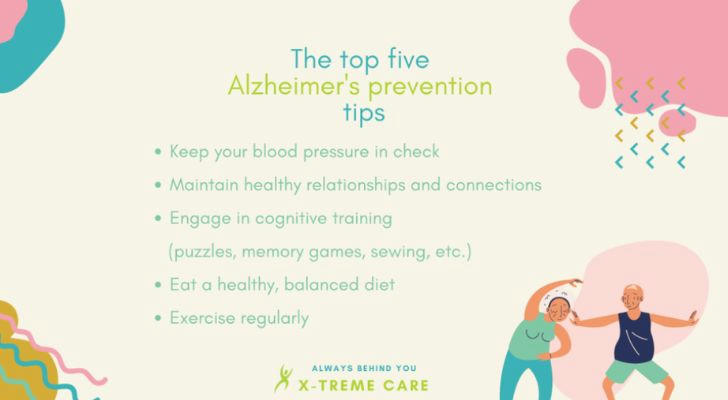New health guidelines for 2025: Preventing Alzheimer's disease and dementia
Did you know that up to 40% of dementia cases may be preventable? By making lifestyle changes today, you can significantly lower your risk of developing Alzheimer’s and dementia later in life. This article explores science-backed strategies to safeguard your brain health, including nutrition, exercise, mental engagement, social interaction, sleep quality, and regular health check-ups.

Nutrition: The Foundation of Brain Health
A nutrient-rich diet plays a crucial role in cognitive function and overall brain health. Research highlights the Mediterranean diet as one of the most effective dietary approaches for reducing Alzheimer’s risk. This diet is rich in:
- Omega-3 fatty acids: Found in fatty fish, walnuts, and flaxseeds, these nutrients help reduce inflammation and support brain function.
- Antioxidants: Berries, leafy greens, and colorful vegetables help protect brain cells from oxidative stress.
- Whole grains and healthy fats: Foods like quinoa, oats, and olive oil contribute to better vascular health, which is essential for cognitive function.
The MIND diet, a blend of Mediterranean and DASH (Dietary Approaches to Stop Hypertension) diets, has also been associated with a significantly lower risk of dementia. Limiting processed foods, added sugars, and saturated fats while increasing nutrient-dense foods can create a strong foundation for long-term brain health.
Exercise: Physical Activity for Cognitive Vitality
Regular exercise enhances blood circulation to the brain, stimulates neuron growth, and helps preserve cognitive abilities. Studies show that engaging in aerobic activities can lower dementia risk. Aim for:
- 150 minutes per week of moderate-intensity aerobic exercise (e.g., brisk walking, cycling, dancing).
- Strength training twice a week to improve muscle mass and overall physical resilience.
- Balance and flexibility exercises such as yoga and tai chi, which enhance coordination and promote a mind-body connection.
Even short bursts of physical activity, such as a brisk 10-minute walk, can contribute to brain health. Integrate movement into daily routines, like using stairs instead of elevators or taking active breaks during work hours.
Mental Stimulation: Keep Your Brain Active
Cognitive engagement helps maintain neural connections and promotes lifelong learning. Activities that challenge the brain include:
- Reading, writing, or learning a new language to enhance cognitive flexibility.
- Playing musical instruments or engaging in strategic games like chess or puzzles to improve problem-solving skills.
- Practicing mindfulness and meditation to reduce stress and improve focus.
Lifelong learning and engaging in intellectually stimulating activities have been linked to a lower risk of cognitive decline. Make it a habit to challenge your brain daily.
Social Connections: The Power of Interaction
Strong social networks contribute to emotional well-being and cognitive resilience. Research suggests that people with active social lives have a reduced risk of developing dementia. Ways to strengthen social connections include:
- Joining community groups or clubs to meet new people with shared interests.
- Regularly interacting with family and friends through in-person visits or virtual calls.
- Volunteering or participating in group activities to foster meaningful relationships and reduce feelings of isolation.
Building strong social ties enhances mental stimulation, emotional support, and overall life satisfaction.
Sleep: Essential for Brain Health
Quality sleep is essential for memory consolidation and clearing brain toxins that accumulate during the day. To promote healthy sleep habits:
- Aim for 7-9 hours of sleep per night.
- Maintain a consistent sleep schedule by going to bed and waking up at the same time daily.
- Create a relaxing bedtime routine by avoiding screens and engaging in calming activities such as reading or meditation.
Addressing sleep disorders, such as sleep apnea, is also crucial. If experiencing persistent sleep disturbances, consult a healthcare professional to improve sleep quality and overall brain function.
Cognitive Self-Test: 10 Common Questions for Alzheimer’s Screening

Here are 10 common questions used to screen for Alzheimer's disease. If you or a loved one frequently experience these issues, consider consulting a doctor for further evaluation.
Memory loss affecting daily life
- Do you often forget recent conversations or events?
Difficulty in planning and problem-solving
- Do you struggle with handling bills or simple calculations?
Challenges in completing familiar tasks
- Is it difficult to cook, use household appliances, or drive to familiar places?
Confusion with time and place
- Do you often forget the date, season, or even where you are?
Trouble understanding visual and spatial relationships
- Do you have difficulty reading, judging distances, or distinguishing colors?
Problems with speaking or writing
- Do you frequently struggle to find the right words when speaking or writing?
Misplacing things and unable to retrace steps
- Do you often put items in unusual places and cannot recall where they are?
Decreased judgment
- Do you make poor decisions, such as mishandling finances or neglecting personal hygiene?
Withdrawal from social activities
- Have you lost interest in social gatherings or hobbies you once enjoyed?
Changes in mood and personality
- Do you frequently feel confused, anxious, depressed, suspicious, or easily upset?
If multiple symptoms are present and impact daily life, it is recommended to seek medical advice for a comprehensive evaluation and early intervention.
Conclusion
Preventing Alzheimer’s and dementia requires a proactive, multifaceted approach that includes proper nutrition, regular exercise, mental engagement, strong social connections, quality sleep, and consistent health monitoring. By adopting these lifestyle habits, you can significantly reduce the risk of cognitive decline and support long-term brain health.
Taking steps today to prioritize brain health is an investment in a vibrant and fulfilling future.
